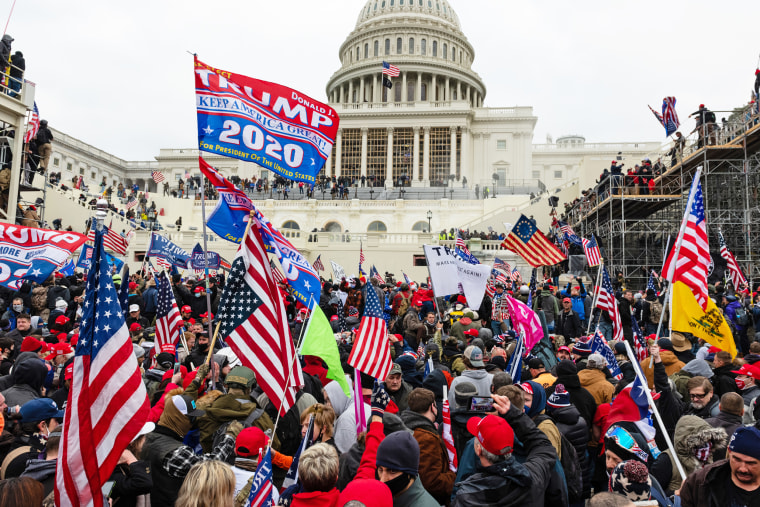WASHINGTON — The $1.7 trillion government funding bill released Tuesday includes extra money for the Justice Department to prosecute Jan. 6 cases. Congress hopes to pass it this week.
The package would give U.S. attorneys a budget of $2.63 billion for the coming fiscal year, a $212.1 million boost above current levels. One reason for the additional money is “to further support prosecutions related to the Jan. 6 attack on the Capitol and domestic terrorism cases,” according to a summary provided by the House Appropriations Committee.
NBC News reported in October that the Justice Department said it was in critical need of additional resources for its investigation into the Capitol attack in 2021; more than a dozen sources familiar with the probe expressed concerns about the resources available for the investigation.
The Justice Department had requested $34 million from Congress specifically to carry on the investigation. “The cases are unprecedented in scale and [it] is expected to be among the most complex investigations prosecuted by the Department of Justice,” the Justice Department previously told Congress, adding that the funding was “necessary for the continued prosecutions of the growing number of cases related to this breach of the U.S. Capitol that has left the Department with an immense task of finding and charging those responsible for the attacks.”
As it awaited funding, the Justice Department propped up the sprawling investigation with the help of U.S. attorneys’ offices around the country, who have lent federal prosecutors to the effort.
A source involved in the Jan. 6 criminal investigation said Tuesday they were “sincerely grateful” for the proposed boost in funding.
“For reasons that we understand and for many reasons that may manifest only with the passage of time, it’s crucial for us to have the resources that allow us to work as hard as we can for as long as we can,” said the person, speaking on the condition of anonymity.
Proponents of fulfilling the Justice Department's request have long seen the funding bill as their last opportunity to secure the money, fearing a Republican-controlled House would block the request early in the new year.
The House Appropriations Committee, which is led by Democrats for two more weeks, justified the boost in funding for U.S. attorneys, which will include increases for salaries and expenses, in a separate statement by citing “heightened prosecution workload arising from the U.S. Capitol attack and domestic terrorism cases,” among other investigations involving Covid-19 fraud, civil rights and white-collar crime.
In addition, the FBI would receive $11.33 billion, “an increase of $569.6 million above the fiscal year 2022 enacted level and $524 million above the President’s budget request, including for efforts to investigate extremist violence and domestic terrorism,” the Appropriations Committee summary said.
The FBI has arrested about 900 people in connection with the Jan. 6 attack, and it has the identities of hundreds more who have not been arrested. The total number of people who could be charged in connection with storming the Capitol on Jan. 6 — either with unlawfully entering the building or with attacking law enforcement outside — is roughly 3,000.
Three more arrests were unsealed Tuesday alone: those of Dr. Jacquelyn Starer, a Massachusetts physician who is accused of assaulting an officer; Rebecca Lavrenz, a Colorado woman who the FBI said admitted she had gone inside the Capitol during an interview in April 2021; and Paul Modrell of Maryland, who is alleged to have been recorded on CCTV video inside the Capitol. Last week, the FBI re-arrested Jan. 6 defendant Edward Kelley, who is accused of plotting to kill FBI special agents involved in his investigation.
The funding legislation, which was negotiated by House Speaker Nancy Pelosi, D-Calif., and Senate Majority Leader Chuck Schumer, D-N.Y, has the backing of key Senate Republicans, like Minority Leader Mitch McConnell of Kentucky and Appropriations Committee Vice Chair Richard Shelby of Alabama, putting it in a strong position to get the 60 votes needed to break a filibuster and pass the Senate.
“I’ve always been for prosecuting anybody who violated the law on January the 6th,” said Sen. Roy Blunt, R-Mo., a senior appropriator and member of Republican leadership. “And there are, like, 800 cases already. So I can’t imagine that they don’t need some extra money.”
House GOP leaders have opposed the package from the onset of negotiations, but it is likely to pass with mostly Democratic votes.
“The attack on our Capitol remains an indelible stain on our democracy,” Schumer said Tuesday on the Senate floor while praising other provisions in the bill to tighten election laws to prevent future Jan. 6-style events. “The omnibus is an aggressive, generous and far-reaching package.”
He said he hopes to pass the bill “very soon.”
Sen. Joe Manchin, D-W.Va., who co-wrote the election reform measure, said it and the additional Justice Department funding are “meaningful steps” in preventing another Jan. 6. “There’s some good things that we’ve gotten in this,” he said.
McConnell, speaking on the floor after Schumer, did not mention Jan. 6 but praised the legislation, particularly its defense spending increases, and urged his colleagues to support it.
“The Senate should pass this bill,” he said.


